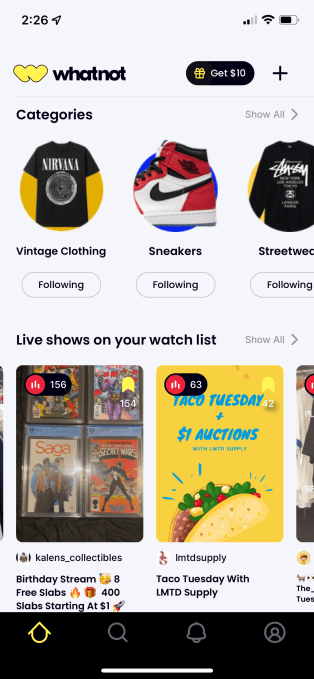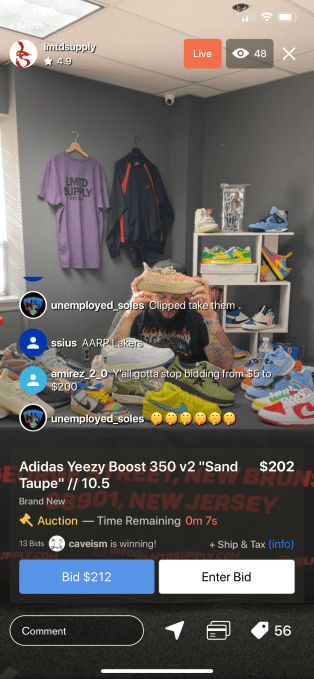Livestream shopping platform Whatnot has come a long way from being run out of a garage in Phoenix to now a 120-person company, valued at $1.5 billion, that’s expected to grow to over 300 people by year-end as its business explodes. To aid on that front, Whatnot is making two key hires, one of which involves the acquisition of Pastel Labs, a company founded in 2020 by Jeff Chang, previously the technical lead for Pinterest’s growth team and a well-known growth advisor. Chang has now become Whatnot’s head of Growth, as a result of the all-stock deal that’s considered more of an “acqui-hire” as it doesn’t involve IP. In addition, Whatnot is announcing the hire of the former head of Growth and Product Engineering for Lyft, Ludo Antonov as VP and head of Engineering.
Whatnot co-founder and CEO Grant Lafontaine characterized the Pastel Labs deal — which was finalized in December, but not yet announced — as being in the five to 10 million-dollar range. Pastel Labs had been a small, five-person team that was building experimental products, including a software-as-a-service product designed to capture user video testimonials and an edtech marketplace for online tutoring.

Lafontaine had originally gotten to know Chang through Y Combinator, the accelerator program Whatnot participated in just before COVID hit in winter 2020. In the early days, the startup — which largely focused on reselling collectibles like Funko Pops — couldn’t raise money as people were instead focused on the pandemic, not frivolity. Whatnot even had to relocate from LA to Phoenix for a time. But the team kept building, understanding that live and social commerce in the U.S. market was in the early stages, and still had a lot of potential.
“[Chang is] actually one of the people at Y Combinator who teaches growth,” notes Lafontaine, describing Chang as one of the top people in the world in terms of knowing “how to scale a company, grow it and the mechanisms for doing that.” Chang had already advised Whatnot on some of its growth problems in the past, he notes. And as they talked more, Lafontaine saw how some of the things being developed at Pastel Labs could be better applied at Whatnot, which had just seen 60x growth over the past year.
Whatnot raises another $150M for its livestream shopping platform, evolves into a unicorn
At Whatnot, Chang will focus on scaling the seller side of its marketplace, which is today focused on collectibles like sports and game cards, toys, comics, vintage games and, more recently, other enthusiast categories like sneakers, vintage fashion and vinyl records. He’ll also work on building up the buy-side of Whatnot’s business, and figuring out the mechanics needed there to continue to scale — whether that’s advertising or sharing tools, or anything else. Chang will lead the growth team, which is now a half-dozen employees and planning to expand.
Antonov, meanwhile, has previous experience at a number of top tech companies like Lyft, Pinterest and Hulu, and will now run Whatnot’s engineering team.

“Ludo has, one, helped build world-class engineering teams — from the growth team at Pinterest, which was one of the best growth teams in the world — to running a couple hundred-person product and growth engineering team at Lyft,” praises Lafontaine. “His background is just about as perfect as it gets for Whatnot. He’s worked in video. He’s worked at content and Pinterest, and he’s worked in a marketplace at Lyft.”
Whatnot, he adds, encompasses all three — it’s a content platform, marketplace and video platform.
Together, the new hires will help to guide the still expanding startup in the months to come as it navigates into new areas, which now includes NFTs, and as it tackles other challenges, like scaling, low-latency environments or building out discovery systems that rely on real-time data. In the year ahead, Lafontaine says Whatnot will continue to expand outside of collectibles and other enthusiast categories. The team also plans to add new consumer-facing features and more seller tools.
“Jeff and Ludo both bring a wealth of experience as leading growth and marketplace engineering teams, where they not only married both content and commerce but displayed the chops for scaling a company to hundreds of millions of users,” said Lafontaine. “We couldn’t be more excited to have both Ludo and Jeff join Whatnot.”































Comment